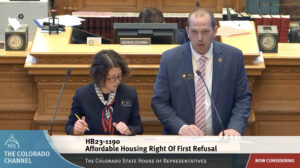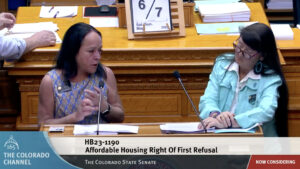A coalition involving 17 business, construction and real-estate associations is raising pressure on Gov. Jared Polis to veto a bill that would make Colorado the first state to give cities and counties a right of first refusal to step in and purchase apartment complexes under contract for sale.
Over the past week, four groups and an alliance of myriad organizations all have written to the Democratic governor requesting he use his veto pen on House Bill 1190, which received legislative approval only after numerous amendments and over some bipartisan opposition. Polis, who has vetoed six bills already this year, has until June 7 to sign or veto all legislation passed during the 2023 legislative session or to allow it to become law without his signature.
While most business groups opposed the bill as it went through the legislative process, it initially appeared that the series of amendments added to HB 1190 would be enough to keep them from seeking a veto. Colorado Concern, for example, said last week that it didn’t plan to ask for any vetoes, and only the Denver Metro Chamber of Commerce went public early on saying they felt Polis needed to step in and block its becoming law.
“Suppress the real estate market”
But opposition swelled significantly, with Colorado Concern joining the Colorado Apartment Association, Colorado Association of Home Builders and commercial real estate development association NAIOP in penning veto requests on HB 1190 since May 19. And on Thursday, the Colorado Real Estate Alliance — an organization of 17 business groups, including some of the aforementioned opponents and associations from the Downtown Denver Partnership to the Colorado Association of Realtors — made the same ask of Polis.
While no one is sure what the governor will do, observers have noted that Polis’ oft-repeated statements on solving Colorado’s affordable-housing crisis have focused on building more units far more than on helping government to hold down the costs of existing housing.
“While on its surface the intent of the bill appears to help alleviate issues associated with Colorado’s affordable housing crisis, it actually confiscates valuable rights from Colorado property owners and creates opportunities for local governments to cease voluntary private property transactions and suppress the real estate market and Colorado economy,” the CREA letter reads. “Along with our state’s elected leaders, residents and business community, we agree that housing affordability and availability is a critical issue that must be addressed; however, we also believe that this legislation has the potential to limit capital investments in multi-family housing, making it less attainable — the very dynamic our state is trying so diligently to avoid.”
Supporters’ reasoning for right of first refusal

Colorado state Reps. Emily Sirota and Andy Boesenecker discuss their bill to create a right of first refusal for local governments in most apartment sales.
HB 1190, sponsored by Democratic Reps. Andy Boesenecker of Fort Collins and Emily Sirota of Denver, would allow cities and counties to step in when the owner of an apartment property has agreed to sell it and take possession instead if it offers the same price. Amendments limited the bill to complexes of at least five units in rural/resort areas and 15 units in urban areas and complexes that are at least 30 years old, and governments would have seven days to declare their right, 21 more business days to make an offer and 60 more days to close.
Backers — which included a host of housing groups, workers’ rights organizations and local governments — noted many sales now happen in a matter of days to out-of-state buyers paying cash, giving local officials little time to try to preserve below-market-rate housing. And with some transactions leading to property improvements that result in rent hikes and displacement of existing residents, local governments need more tools to keep existing housing affordable and offer living space to everyone from local service-industry workers to teachers.
“The need in our community often feels overwhelming, and we need tools like the first right of refusal,” Larimer County Commissioner Kristin Stephens said during a hearing on the bill in early March. “People in our community should not live in fear. And stable affordable housing should be reality, not a dream.”
Reasons for veto requests on right of first refusal
But the growing coalition of veto requests argue that rather than boost or maintain the stock of affordable housing in the state, ratification of HB 1190 could have the opposite effect. While a minimal number of local governments may have resources to employ the tool, the mere existence of the law will repel investment in multifamily real estate by companies unwilling to consider financing or purchase of such properties when the sale may get nullified.
Several of the letters point out how common it is to buy or sell groups of multifamily properties spread across several states, none of which other than Colorado would step in to slow the process and allow a local government to mull buying one of the properties separately. That kind of unknown injects a financial risk for which buyers will demand a reduction in sale price, thereby lowering the value of Colorado properties, argued Andrew Hamrick, general counsel of the Colorado Apartment Association.
An assessment by The CoStar Group estimated HB 1190 would create a 3.23% cumulative decrease in the value of Colorado commercial real estate, equivalent to the loss of $1.57 billion in value in what’s now a $48 billion market, Colorado Concern leaders wrote to Polis. That in turn would reverberate into reductions of assessed value on the local level that would lead to lower property-tax collections for schools, libraries and fire districts, several groups warned.
Furthermore, having such a right of first refusal hanging over any property would mean that property could not get a clean title, which would discourage lenders and would discourage buyers from even doing the due diligence of examining an investment, Hamrick wrote.
The bigger debate on housing this session

Colorado state Sens. Faith Winter and Sonya Jaquez Lewis explain House Bill 1190 to the Senate on May 6.
“I can report that I have been contacted by out-of-state real estate investment trust managers to discuss this specific bill and how it would impact their potential investments,” NAIOP Colorado Executive Director Kathie Barstnar wrote. “Everyone has asked me to explain why they should still look at Colorado if this goes into effect. Unfortunately, I don’t have a good answer for them.”
Several counties have, in recent years, put into effect such a right of first refusal, but it’s never been done before on a statewide basis.
Polis’ consideration of HB 1190 came after legislative leaders who pledged to focus with new urgency on the affordable-housing crisis rejected a number of suggestions offered this session. They killed bills to allow local governments to implement rent control and to limit reasons that landlords can use to evict tenants, and Polis’ land-use reform bill focused on increasing density and speeding construction along heavily trafficked corridors died during a staredown between the House and Senate over whether it should include pre-emption of local zoning rules.
The governor has signed several housing bills, including a measure to streamline public-private partnerships to construct workforce housing on state-owned land and a law to increase transparency around the growing number of metro districts. And he still has the opportunity to sign House Bill 1189, which would create a tax credit for employers who contribute money to special savings accounts that workers can use toward purchase of a home.
